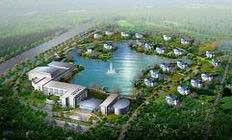 From now until 2020, China plans to build an additional 400 new cities, among which is the experimental urban area Dongtan – the “eco-city” that is the first of its kind in the world.
From now until 2020, China plans to build an additional 400 new cities, among which is the experimental urban area Dongtan – the “eco-city” that is the first of its kind in the world.
Dongtan will rise from the desolate wetlands located in the northernmost part of Chongming, China’s third-largest island, near the mouth of the Yangtze River. Here, no building will exceed eight stories in height, and all rooftops will be covered with grass and plants to provide insulation and water recycling.
The city will offer pedestrians six times more space than Copenhagen (Denmark) – one of the most airy cities in Europe. Clean, fuel-cell-powered buses will connect various neighborhoods.
Traditional motorcycles are banned, and residents will commute using bicycles and electric scooters. The roads have been designed in such a way that it is quicker for people to get to work by bike or on foot than by car.
Up to 80% of solid waste will be recycled. Incinerated in a thermal power plant, organic waste will generate a portion of the city’s electricity. Rice husks, a high-thermal fuel source that is readily available in China, will also be burned there. Furthermore, gigantic wind turbines powered by sea breezes will produce additional electricity. Each building will be equipped with small wind turbines and individual photovoltaic panels.
The project has been entrusted to the Shanghai Industrial Investment Corporation (SIIC) for seven years. For the design of Dongtan, SIIC has enlisted the help of Arup, a prominent UK engineering consultancy that has worked in China for 20 years and was involved in the architectural project for the 2008 Beijing Olympics. The political significance of the Dongtan project is underscored by a contract signed in the presence of British Prime Minister Tony Blair and Chinese President Hu Jintao.
Dongtan is expected to be constructed within four years.




















































